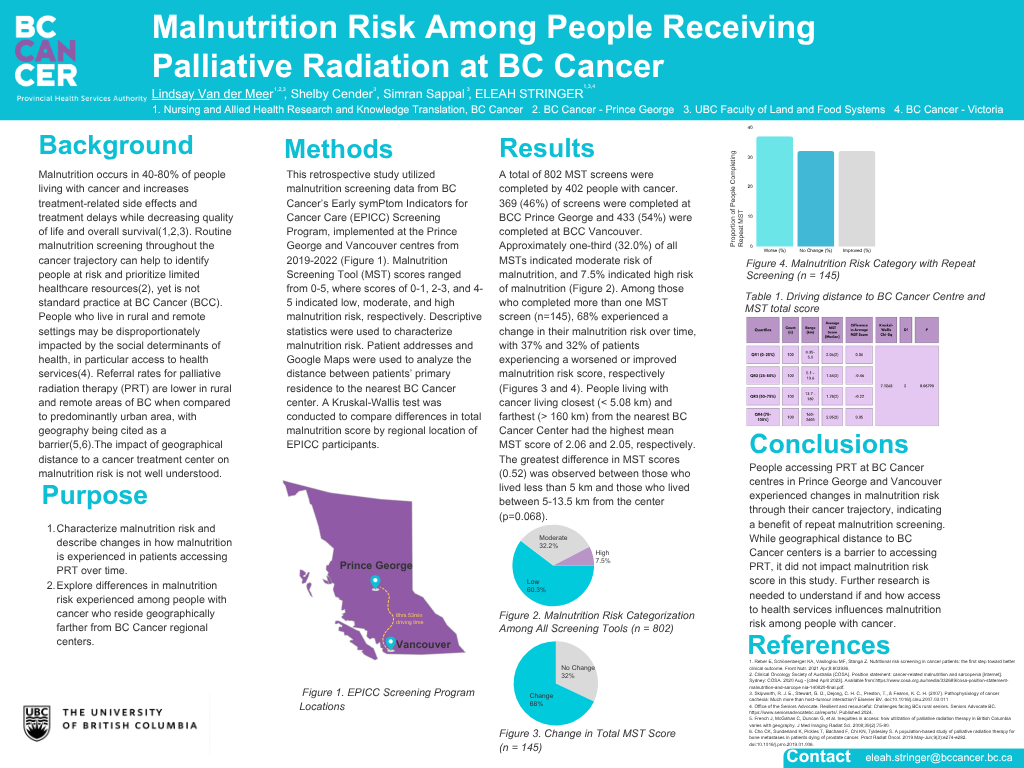Malnutrition Risk Among People Receiving Palliative Radiation Therapy at BC Cancer

Leads: Lindsay Van der Meer, Eleah Stringer
This study examined how the risk of malnutrition varies with distance from the nearest BC Cancer centre in patients receiving palliative radiation therapy for gastrointestinal or breast cancer.
This study was a collaboration between Nursing and Allied Health Research and KT Department and UBC’s Master of Nutrition and Dietetics Program. The project was led by Eleah Stringer and Lindsay Van der Meer, and executed by MND students Shelby Cender and Simran Sappal.
Study Background & Rationale:

Background: People who live in rural and remote settings may be disproportionately impacted by the social determinants of health, in particular access to health services. The impact of geographical distance to a cancer treatment center on malnutrition risk is not well understood. This research project characterized and analyzed malnutrition risk in relation to distance to the nearest BC Cancer centre among people receiving palliative radiation therapy (PRT) for gastrointestinal or breast cancer.
Study Objectives:The purpose of this study was to characterize and analyze the risk of malnutrition in relation to the distance patients live from the nearest BC Cancer centre among individuals receiving palliative radiation therapy (PRT) for gastrointestinal or breast cancer. |
Methodology: | ||
This retrospective study utilized malnutrition screening data from BC Cancer’s Early symPtom Indicators for Cancer Care (EPICC) Screening Program, implemented at the Prince George and Vancouver centres from 2019-2022. | Malnutrition Screening Tool (MST) scores ranged from 0-5, where scores of 0-1, 2-3, and 4-5 indicated low, moderate, and high malnutrition risk, respectively. Descriptive statistics were used to characterize malnutrition risk. | Patient addresses and Google Maps were used to analyze the distance between patients’ primary residence to the nearest BC Cancer center. A Kruskal-Wallis test was conducted to compare differences in total malnutrition score by regional location of EPICC participants. |
Results:
- Of 802 screens from 402 cancer patients, 32% indicated moderate and 7.5% high malnutrition risk, with 68% of repeat screeners showing changes over time.
- Highest MST scores were found in patients living both very close and very far from cancer centres, though differences by distance were not statistically significant.
Conclusion:
- Malnutrition risk changed over time for many patients, supporting the need for ongoing screening.
- Geographic distance to cancer centres was not associated with malnutrition risk, but further research is needed on how access to services may influence outcomes.
Questions?
If you are interested to learn more, please contact Lindsay Van der Meer at Lindsay.VanderMeer@bccancer.bc.ca.
BC Cancer Foundation is the fundraising partner of BC Cancer, which includes BC Cancer Research. Together with our donors, we are changing cancer outcomes for British Columbians by funding innovative research and personalized treatment and care.
